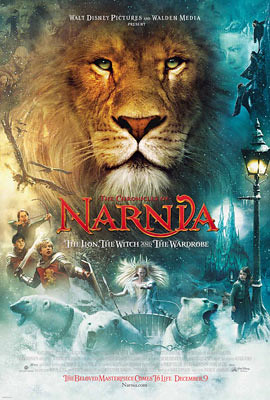The Trials and Tribulations of Narnia
The Chronicles of Narnia: The Lion, The Witch, and The Wardrobe is released in theatres this Friday December 9th. Among anticipation for the first feature length adaptation of the children’s classic, there has also been criticism regarding the film’s subject matter.
Narnia has by many, always been considered the result of C.S. Lewis’ conversion from atheist to Christian. In fact, Lord of the Rings author, J.R.R. Tolkein and Lewis were friends and colleagues, and would debate the subject matter of fate often. It was Tolkein who played a large part in Lewis’ embracing of Christianity. (The Chicago Sun-Times actually just published a great article about Tolkein and Lewis.)
Because of the Christian allegorical elements of the C.S. Lewis works, Disney has reached out to churches across the country and even employed a Christian network marketing firm to help spawn enthusiasm for the among evangelical congregations. Some people find this behavior akin to religious propaganda and are abhorrently opposed both the film’s overt Christian elements, and Disney’s theologically driven campaign. I myself am a little perplexed about Disney’s marketing scheme, because while I realize that money is their ultimate goal, I think this is the kind of film that has such broad appeal, it doesn’t need to focus on just the Christian base.
However, some people have gotten beyond confusion into near rage. While visiting a friend’s blog , I came across an article published in the UK Guardian that irked me. The writer, Polly Toynbee, a self-proclaimed atheist, slams Lewis and the Narnia Chronicles, as well as the film, for its swooning Christian themes. The article rails upon the film for being so blatant in its religious messages, saying that the film’s only saving grace is that most children won’t be able to pick up on them anyway. While it makes some startling points about the connection between the sponsership of the film and the conservative religious right in this country, it also tears apart some of the foundations of Christianity itself. Since when did movie reviews become forums for religious analysis? Toynbee says it’s rude and inappropriate to parade around religious fervor in the way that Lewis’ books and now the film does. But isn’t it also rude and inappropriate to call a religion “repugnant” as Toynbee does at one point?
I just don’t understand what the big deal is. I read the books in school as a child, and despite the fact that I went to an Episcopalian school, the religious themes were only mentioned, and we primarily studied the book as we would any other work of children’s literature. I certainly didn’t love the books strictly because of or in spite of their Christian themes. I loved them because they were wonderfully fun and engaging books to read. I haven’t seen the movie yet, and I’m not sure just how obvious the religious iconography and symbolism is, but either way,does it matter? To a lesser extent, this film has had some of the hoopla that Passion of the Christ did. But I don’t understand why. (I didn’t understand with POTC either) Movies, are movies. They are made for different reasons, by different people, who believe different things. They are neither vehicles of salvation nor paths to damnation. At their best, they are works of art (ostensibly), that reflect the inner perepectives of those who worked on it.
I think people will go to see Chronicles of Narnia, and if it’s a well made film and an adept adaptation, be able to derive a variety of things out it. Children may love to see the books that they’ve read come to life on the big screen. Adults may feel a sense of nostalgia as they recall the first time they became familiar with the stories. People who haven’t read the books at all may enjoy it as simply a large fantastical spectacle, and still others may get a sense of spiritual inspiration from it.
Steven Spielberg does not do any director’s commentaries on his DVD’s. This is because, as rumor has it, he likes to leave his audience with a sense of personal interpretation. The best artists know that people may look at their work in a way they had never dreamed.
And so I say to the critics out there, griping about Narnia and its meanings, let the film stand for itself. The film might be good or bad, but theological agenda or not, it’s based on a beloved children’s fantasy that has been widely read since it’s publication. What I’m curious about is how artfully done the adaptation will be…





1 Comments:
"There I have another name. You must learn to know me by that name. This was the very reason why you were brought to Narnia, that by knowing me here for a little, you may know me better there."
Post a Comment
<< Home